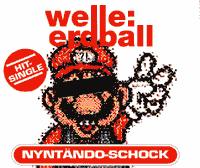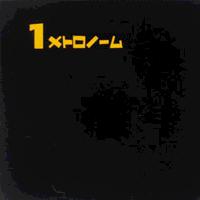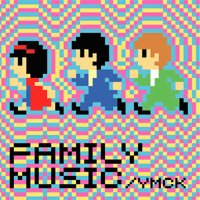
Not exactly an album, specifically a Maxi-Single. But it was the first release by the group.
Version 1.2a
by Matt M.
Disclaimer
This article may not be copied, sold, or reproduced without the author's permission. You may, however, link to this document without the author's initial consent.
HISTORY
...Starting with the early-mid 90's...
The Gamewave movement (as I refer to it) began in the early 90s with the idea of Game music as a mainstream genre. It was often the dream of many 'geeks' to hear their favorite Commodore 64 or NES tune playing on the radio, or perhaps a Chiptune-based song to grace the airwaves of MTV or VH1. The early composers of chiptune music thrived mainly within the Commodore 64 demo scene, but the idea of an actual band who would base their sound on such things seemed rather silly at the time. Although it is dubious to say who was the first to ever attempt that kind of concept, we can at least start with a single notable band from Germany under the name of Welle: Erdball. They were an obscure group who experimented with C64 sound samples, and wrote clever lyrics; recognized for being the artists who brought the bitpop/gamewave idea 'out of the closet', but to what extent their music had in influencing other bands is in question. Of course, this wasn't enough to expand game-type music into the mainstream, because there remained little (if any) 'scene', even after Welle: Erdball's appearance. Yet, it may have motivated more underground artists to begin exercising the concept. In reality, it was viewed as something which was only for 'geeks', since the genre had a mostly exclusive audience. If one was to take notice of the lyrics from this era, it was not suprising to see that themes centered on geek-fandom, sharing harmony with both listeners and music. This would leave its 'development' in the hands of amateurs. In turn, not only was the genre's mainstream vision being murdered, but the lack of depth and creativity meant that the genre would struggle to survive in the underground, as well.
...Now beginning with the late 90s-early 2000's...
Time seems to fly by so quickly, and things were starting to change for the scene. 'Artists' whose experiments failed (or even backfired) came and went. But any form of growth for the genre seemed futile. It was not until the birth of a japanese group in 1998 by the name of Metronome, that the gamewave bands began to imagine a workable concept. A loose combination of rock, classical/orchestra, and picopop (among other things) was the initial driving force behind Metronome's sound, which meshed with bizzarre and wacky lyrics. They recorded several demos and 2 years later (in 2000) after they formed, released their first album, "Yapuu ga Shoukansareta Machi". During that same year, a band in Sweden formed known as Machinae Supremacy. Their emphasis was mainly on a hybrid of Heavy Metal and the integration of the SID chip via SIDStation. Machinae Supremacy was not influenced in any way by Metronome - however, there were parallels in the notion of combining digital-chip music with rock/orchestra. Despite that, both bands played considerably different styles within a vaguely similar realm. At last, the scene finally began to produce quality material.
Let's move on to 2004-2005:
Slowly, but surely enough, the scene was beginning to expand. In the last four years, Metronome had already released a handful of singles, 5 albums, and 1 DVD. Machinae Supremacy had produced a successive run of free MP3s for online distribution, leading up to the release of their debut CD, titled "Deus Ex Machinae" in 2004. That same year also raised the sail for related bands in Japan, such as MOSAIC.WAV, and YMCK. These bands would again reflect on some of the elements that were abundant in the contemporary Gamewave scene, but simultaneously introduced new ideas; MOSAIC.WAV carried an anime-inspired bubblegum taste, with lyrics cluttered by Akihabara pop culture references. For YMCK, it was Chiptune-driven melodies in a classical/jazz mold. Likewise, the American scene lay in an embyronic stage. One communing group was Mr. Pacman, an underground band from Colorado. Or to make some radical suggestions; the internet served as a hut for a few rock bands covering vintage game tunes (Advantage, NESkimos, Minibosses, etc.), whereas Japan housed an entire ring of them. 14-Year-Old-Girls and HORSE were game-related artists, but the idea of said bands being written into the lineage of gamewave is unlikely. Meanwhile, back in Sweden, Machinae Supremacy went to work on another album.
Game Wave music has continued to develop at a slow pace, but apart from a devoted crowd, it is a hard sell. If someone manages to bring it out into the mainstream, that would be (to some) quite an accomplishment, but to others it may be better that the genre remained underground, away from commercialism which presents volatile results to many artists and their work. However, Game Wave never had much to say beyond music as entertainment, so there is no reason to take it too deeply or seriously. Although the idea of it evolving beyond this point is not impossible.
Anyways, for those interested in the genre, check out the albums below:
Reccomended Gamewave Albums

Not exactly an album, specifically a Maxi-Single. But it was the first release by the group.

Their debut CD. It's up there, in terms of innovation; which is nothing to be suprised about, considering Sharaku and the gang's creative prowess. This is one of their more memorable releases. Be warned that it's a bit underproduced (in terms of mixing/mastering).

Their first full-length album, and essential to any GW or Metronome fan. It includes a majority of Metronome's singles including Self-Control, Mittsu Kazoero, Planet, ōD-SANSKRIT, and some other classics like Thank You For My Everyday, among others. Excellent.

The swedish SID-Metal act's debut album. While it is certaintly not definitive of the majority of the music, they did provide a heavier alternative in the game wave scene.

Mosaic.wav's first full-length CD. Infamous for performing the theme songs of various H-Games, they had finally produced an album of original works. May seem too cutesy for some, but overall enjoyable to any GW/Picopop fan.

YMCK's first full length. The NES (or Famicom, rather) Chiptune is the complete driving force behind all of the sounds on this CD. A musical cake topped with enchanting melodies and songs.
Notes
1*: Chiptune is a word reffering to a piece of music that is based on the sound technology of vintage computers and/or consoles.
2*: PicoPop is a musical genre which is similar to Synthpop or Electropop. The word "PicoPico" refers to an 8-bit type of sound, among the Japanese. This sometimes includes chiptunes. (Examples of this are: YMO, Pine*AM, Plus-Tech Squeeze Box)
3*: "Yapuu ga Shoukansareta Machi" translates to: "The Town Yapuu has Summoned"
4*: SID is the Commodore 64 sound chip.
5*: SIDStation was a limited production synthesizer, based on the C64 SID chip.
6*: Akihabara, a.k.a. "Akiba" by locals, is a district in Japan. It is known as a haven of electronic goods, including anime and games.
7*: H-Games are adult video games, which are primarily manufactured/sold in the PC gaming market. The 'H' refers to 'Hentai', meaning 'bizarre' or 'perverted' in Japanese. Perhaps more accurately translated as 'kinky'. It is mostly associated with illustrated pornography (in anime form).